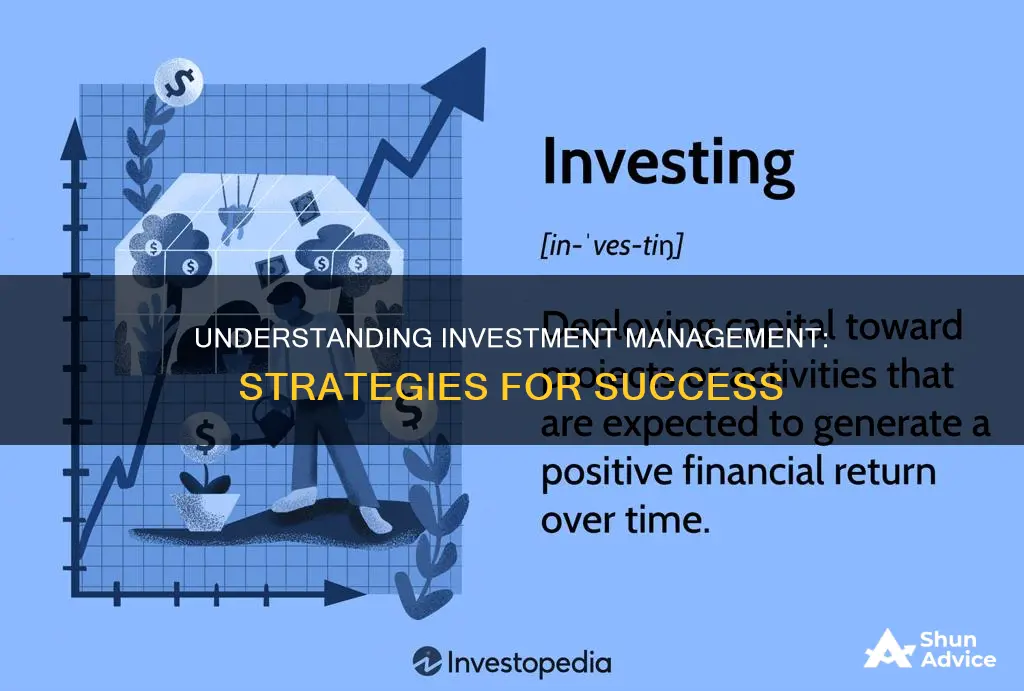
Investment management is the process of handling an investment portfolio or a grouping of assets. It involves buying and selling assets, creating short- and long-term investment strategies, overseeing a portfolio's asset allocation, and developing a tax strategy. The aim is to achieve the return the client needs at a level of risk they’re comfortable with. Investment management can be done independently or with the help of an investment manager.
| Characteristics | Values |
|---|---|
| Definition | The process of building and maintaining an investment portfolio or a collection of financial assets. |
| Purpose | To meet financial goals and improve relationships with clients. |
| Clients | Individual or institutional investors, such as pension funds, insurance companies, governments, educational institutions, private investors, etc. |
| Investment Types | Stocks, bonds, cash deposits, government bonds, shares in new companies, real estate, commodities, etc. |
| Investment Management Firms | BlackRock, Vanguard Group, Fidelity Investments, State Street Global, J.P. Morgan Chase, etc. |
| Investment Management Roles | Investment analyst, financial planner, investment adviser, fund manager, etc. |
| Investment Strategies | Short-term and long-term strategies, diversification, risk management, etc. |
| Fees | Management fee, percentage of profits, sliding scale based on assets, etc. |
| Benefits | Higher potential returns, time savings for clients, expert advice, risk minimization, etc. |
What You'll Learn
- Investment management involves creating a strategy for a portfolio of stocks, bonds and other investments
- Investment managers can help a wide variety of clients make successful investment decisions
- Investment management can be done independently or with the help of a manager
- Investment management firms take on the effort of creating an investment portfolio for their clients
- Investment management includes devising strategies and executing trades within a financial portfolio

Investment management involves creating a strategy for a portfolio of stocks, bonds and other investments
Investment management involves creating and implementing a strategy for a portfolio of stocks, bonds, and other investments. The aim is to achieve an investor's specific financial goals while minimising risk.
The process begins by assessing the investor's risk tolerance, financial goals, and attitude towards risk. This helps determine the types of investments that will make up their portfolio.
For example, an investor with a low-risk tolerance may prefer safer but slower-growing investments like government bonds, while a more risk-tolerant investor might opt for fast-growing but volatile stocks.
Once the investor's risk tolerance and goals are established, an investment manager will decide on the specific investments to include in the portfolio. These could include stocks, bonds, mutual funds, real estate, commodities, or other alternative investments.
The investment manager will then actively manage the portfolio by buying and selling investments as needed to align with the investor's goals and the market conditions. They will also monitor the portfolio's performance and make adjustments to ensure it remains diversified and aligned with the investor's risk tolerance.
Investment management can be done independently or with the help of an investment manager or investment management firm. These professionals provide valuable expertise and guidance to help investors make successful investment decisions and increase their potential returns.
Portfolio Investments: Developing Countries' Failure
You may want to see also

Investment managers can help a wide variety of clients make successful investment decisions
Investment managers work with a variety of clients, from individuals to institutions such as pension funds, insurance companies, governments, educational institutions, and charities. They assess their clients' financial goals, risk tolerance, and current financial situation to create a tailored investment plan. This may include investing in stocks, bonds, mutual funds, real estate, commodities, or other alternative investments.
One of the key benefits of hiring an investment manager is their ability to provide expert advice and guidance. They have the necessary background and skills to help clients make informed decisions, minimize risk, and maximize returns. Investment managers conduct in-depth research and analysis of financial markets, trends, and investment opportunities to make recommendations that align with their clients' goals.
Additionally, investment managers save their clients time by handling the day-to-day management of their investment portfolios. They monitor the performance of the investments, rebalance the portfolio as needed, and provide regular updates and reports to their clients. This allows their clients to focus on their work or other areas of their lives while their investments are being professionally managed.
By working with an investment manager, clients can benefit from their expertise in identifying profitable investment opportunities and managing risk. Investment managers help clients diversify their portfolios across different asset classes and markets, ensuring that their investments are aligned with their risk tolerance and financial objectives.
Overall, investment managers play a crucial role in helping their clients make successful investment decisions by providing personalized strategies, expert advice, and ongoing portfolio management. Their services enable clients to increase their income, save time, and make informed investment choices with greater confidence.
Investment Portfolio: Where to Find and How to Start
You may want to see also

Investment management can be done independently or with the help of a manager
Investment management is the process of handling an investment portfolio or a grouping of assets. It can be done independently or with the help of a manager.
Independent Investment Management
Those who choose to manage their investments independently will need to make decisions about what type of account they want to invest from, what types of investments they want to make, and how much money they want to invest. This option gives investors complete control over their investments and can be a good choice for those who are knowledgeable about the market and comfortable making their own decisions.
Investment Management with a Manager
Those who choose to hire an investment manager will benefit from the manager's expertise and experience in the field. Investment managers typically have a bachelor's degree and often have a master's degree or financial certification. They are responsible for creating an investment strategy that meets their client's goals and use that strategy to decide how to divide the client's portfolio among different types of investments, such as stocks and bonds. They buy and sell those investments as needed and monitor the portfolio's overall performance.
Benefits of Independent Investment Management
- Complete control over investment decisions
- No need to pay management fees or commissions
- Ability to make quick decisions without needing to consult with a manager
Benefits of Investment Management with a Manager
- Expertise and experience in the field
- Ability to provide holistic financial advice on topics like cash-flow management, taxes, insurance, and estate planning
- Time savings for clients, who can continue their work while the manager handles their investments
- Reduced risk, especially for those who are risk-averse
Strategies for Efficiently Monitoring Your Investment Portfolio
You may want to see also

Investment management firms take on the effort of creating an investment portfolio for their clients
Investment management firms offer a valuable service to their clients by taking on the challenging task of creating a bespoke investment portfolio. This service provides clients with access to new investment opportunities and relieves them of the time-consuming responsibility of managing their own financial assets.
Understanding Client Needs
Investment management firms work with a diverse range of clients, from wealthy individuals to companies, charities, trusts, and corporations. Each client has unique financial goals and varying levels of risk tolerance. It is essential for these firms to thoroughly understand their clients' investment objectives, risk appetite, time horizons, and financial circumstances. This information forms the foundation for creating a tailored investment strategy.
Monitoring Potential Investments
The world of investments is vast and ever-changing, ranging from stable options like cash deposits and government bonds to riskier ventures like shares in new companies. Investment management firms, through their team of analysts, diligently monitor the market and evaluate potential investments. They assess investment risks and calculate potential returns, staying abreast of market trends and conditions. This analytical process is crucial for making informed decisions about which investments to include in their clients' portfolios.
Developing Tailored Investment Strategies
The creation of a customised investment portfolio is a complex undertaking. Investment management firms leverage their expertise to construct portfolios that align with their clients' goals and risk tolerance. They carefully select a diverse range of assets, ensuring that the portfolio is well-balanced and not overly reliant on any single investment or asset class. This diversification is a key strategy to mitigate risk and optimise potential returns.
Active Portfolio Management
The work of investment management firms does not end with the initial creation of the portfolio. They continuously monitor the performance of the investments and make adjustments as necessary. This proactive approach ensures that the portfolio remains aligned with the client's goals and adapts to changing market conditions. Additionally, investment managers may provide financial advice in areas such as cash-flow management, taxes, insurance, and estate planning, offering a holistic approach to wealth management.
Benefits of Outsourcing Investment Management
Engaging the services of investment management firms brings several advantages. Firstly, it allows clients to focus on their core activities or other pursuits while their investments are professionally managed. Secondly, investment managers bring a wealth of knowledge and experience, reducing the risk of costly investment mistakes. They have the expertise to navigate the complexities of different asset classes, market dynamics, and investment strategies. Lastly, investment management firms provide access to investment opportunities that may not be readily available to individual investors, thus broadening the range of potential investments.
Strategies to Overcome Investment Portfolio Challenges
You may want to see also

Investment management includes devising strategies and executing trades within a financial portfolio
Investment management involves devising strategies and executing trades within a financial portfolio. It is the process of building a portfolio of stocks, bonds, and other investments to meet specified investment goals.
Investment management can be done independently or with the help of an investment manager. Investment managers are responsible for creating investment strategies to meet their clients' goals and then using those strategies to decide how to divide their clients' portfolios among different types of investments. They buy and sell those investments as needed and monitor the portfolio's overall performance.
The process of investment management involves several steps. First, the investment manager identifies the investor's risk tolerance, which helps determine how much money is divided into stocks versus bonds or other securities. Then, the investment manager chooses specific investments for the client, including stocks, bonds, money market instruments, real estate, commodities, and financial derivatives. Finally, the investment manager monitors the performance of the investments and reports the results back to the client.
The goal of investment management is to maximize returns while minimizing risk by diversifying assets across multiple asset classes and markets. It is important to note that investment management is not just about handling specific assets in a portfolio but also ensuring that the portfolio continues to align with the client's goals, risk tolerance, and financial priorities.
Life Cycle Theory: Savings and Investment Strategies Explored
You may want to see also
Frequently asked questions
Investment management is the process of handling an investment portfolio or a grouping of assets. It involves buying and selling assets, developing short- and long-term investment strategies, creating a tax strategy, and managing asset allocation. It can also include banking, budgeting, and other financial duties.
An investment manager is a person or company that manages an investment portfolio on behalf of a client. They come up with an investment strategy to meet a client's goals, then use that strategy to decide how to divide the client's portfolio among different types of investments, such as stocks and bonds. The manager buys and sells those investments for the client as needed, and monitors the portfolio's overall performance.
Investment management can help a wide variety of clients make successful investment decisions, increasing their income. It also allows clients to continue their work while the manager handles their investments, saving them time. Additionally, investment managers have the background necessary to provide good advice and minimise risk for clients, especially those who are risk-averse.







